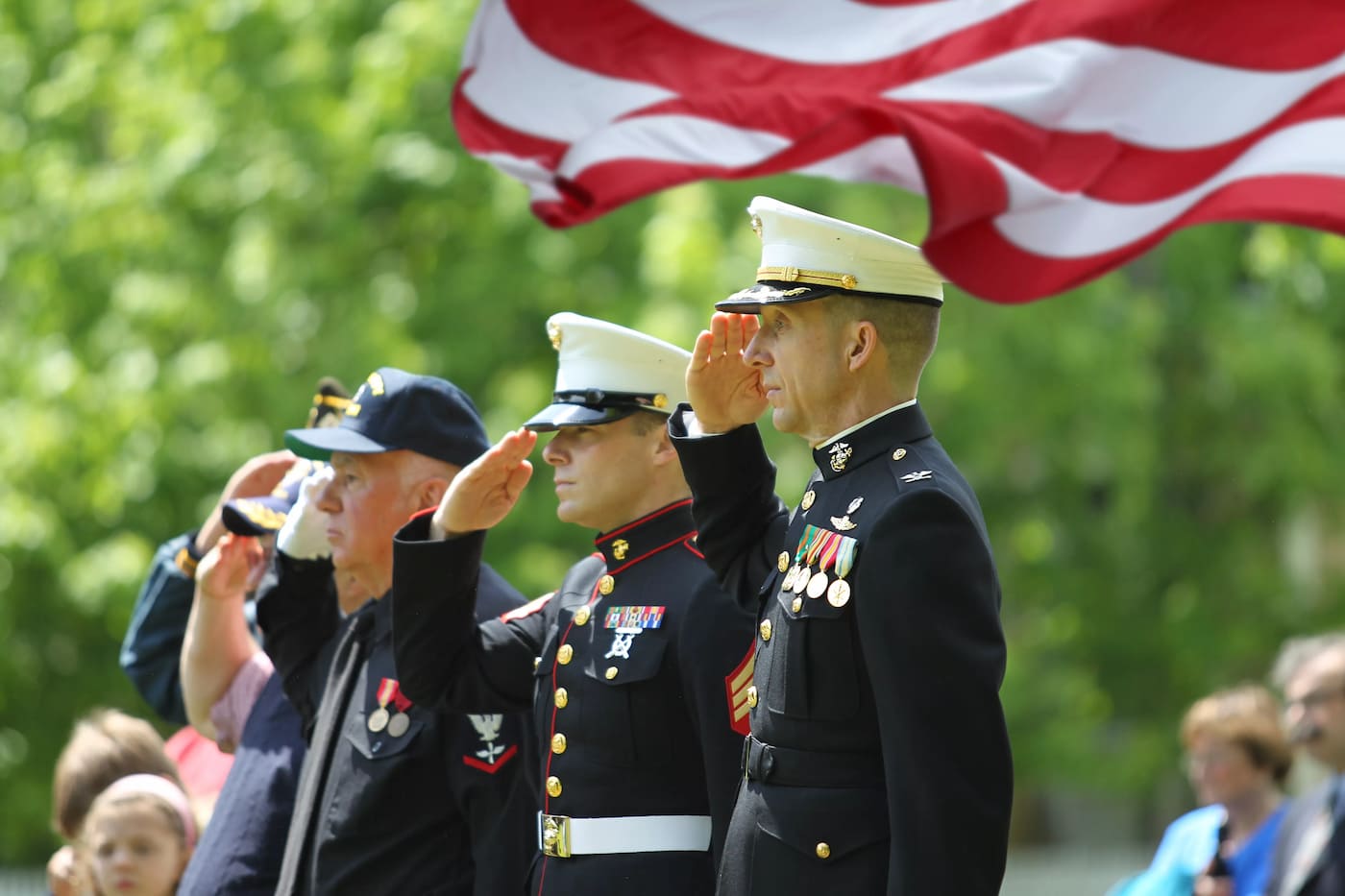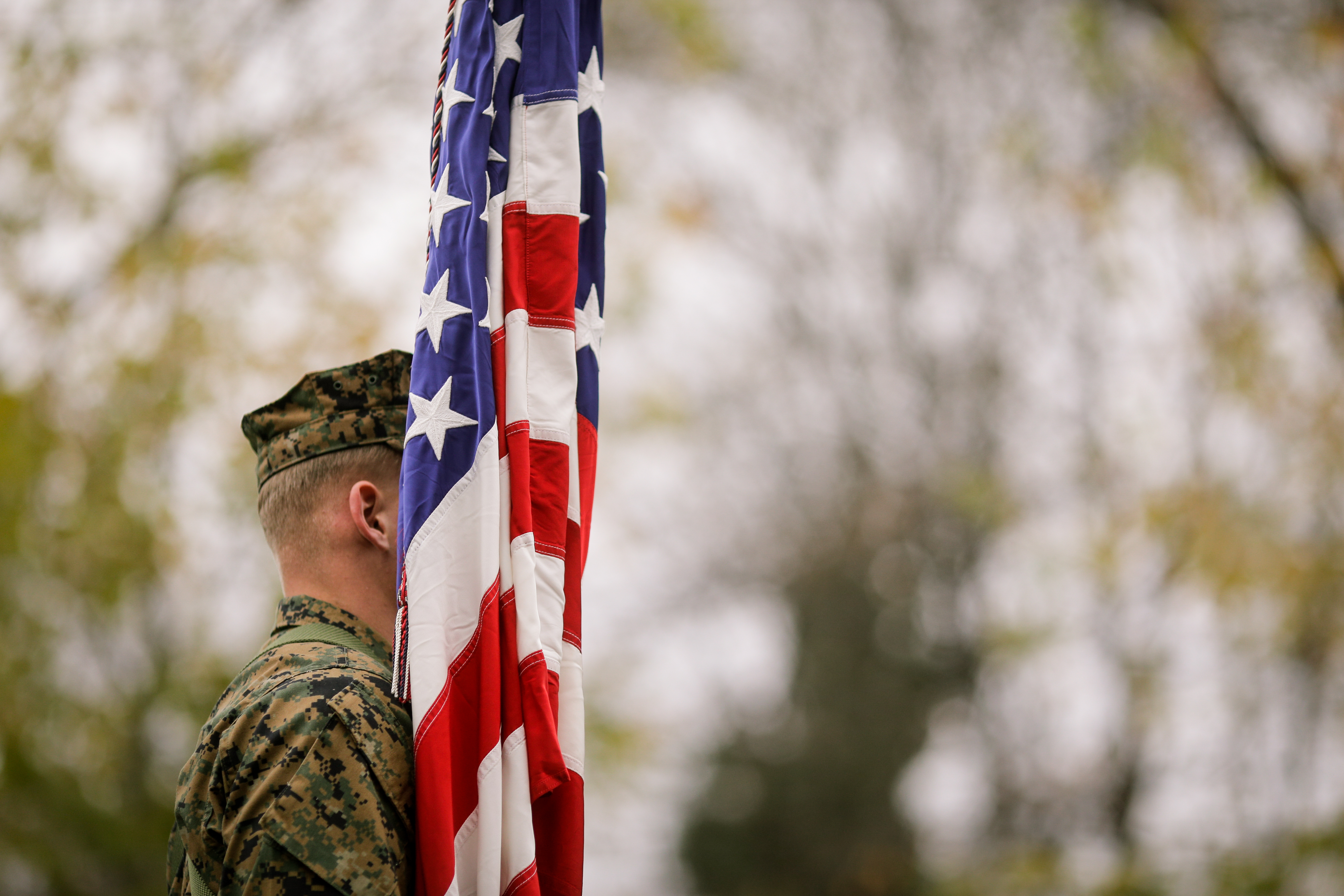During Military Appreciation Month, we sat down with some of the veterans behind Extra Space Storage to talk about their experiences serving in the U.S. military, transitioning from military life back to civilian life, developing leadership and teamwork skills that help them in the workforce now, and what they’re most proud of from their military service. Get to know these Extra Space Storage team members below!

Denise Mitchell, Assistant Store Manager
Denise Mitchell served in the U.S Army for 11 years and medically retired as a Staff Sergeant. She did two tours in Iraq under the banner of Operation Iraqi Freedom (OIF) and one tour to Afghanistan under the banner of Operation Enduring Freedom (OEF). Mitchell was also stationed in Korea for one year as a hardship tour.
Q: What was your transition from military life back to civilian life like?
A: My transition from the military back to normal life was easy for me. There are programs in place that help prior servicemen and servicewomen with everything from job placement, opening our own businesses, and even helping us to further our education.
Q: What skills from your military service have helped you in life and/or your career?
A: The life skills that I have learned that are most beneficial to me are multi-tasking, problem-solving, adaptability, and communication. Each one of these skills assists me every day to achieve small personal goals, as well as my job-related goals here at Extra Space Storage.
Q: What about your affiliation with the military are you most proud of?
A: I am most proud of the fact that I had a chance to be a part of history. When I meet people and spark up a conversation about my service, it makes me feel important to know that there are those out there who support and care for all servicemen and women and what we put on the line for the freedoms that we have. It was a huge sacrifice, but it was well worth it.
Gary Blevins, Store Manager
Gary Blevins served in the U.S. Army from 1982 until 1986 and was honorably discharged. As a truck driver, Blevins logged over 50,000 accident-free miles operating several different types of vehicles. He was assigned to the 1/64th Armor Battalion in Germany (the same unit that Audie Murphy called home) and then the 233rd Transportation Unit out of Fort Bliss in Texas. Blevins hauled both fuel and ammo for the tanks and artillery guns, and in Texas, he was assigned as the lead Motor Pool technician, where he was in charge of the entire section under a commanding officer.
Q: What was your transition from military life back to civilian life like?
A: I found my transition back to civilian life to be normal, but some things about my time in the service still linger to this day. I still call superiors “Sir” or “M’aam,” unless I try really hard not to. My hair has been short ever since then, and I simply abhor being tardy for any reason. I was a little disheartened that my driving experiences in the service did not translate well into civilian life and that I ended up in retail. In the long run, though, that has been a good path for me.
Q: What skills from your military service have helped you in life and/or your career?
A: I was just 18 when I entered, and it was the first time in my life where I found myself becoming an adult, making adult decisions and choices. Graduating basic training was the first truly difficult thing that I did and that I decided I simply would not fail at. That drive to succeed and give my all has been something that has followed me wherever I go and whatever I do.
Q: What about your affiliation with the military are you most proud of?
A: The thing I’m most proud of during my time in the service is that I was awarded the Army Accommodation medal, which is the highest peacetime medal given to a soldier during that time. I also got to fire the main gun of both the Bradley Infantry fighting vehicle and the Abrams tank.
Jerry Holmes, Store Manager
Jerry Holmes joined the U.S. Navy in 1978 and served on three submarines: USS Bonefish, USS Tecumseh, and USS Omaha. He also served at Commander Submarine Force U.S. Pacific Fleet in Pearl Harbor, as well as at Commander Submarine Development Group One and Naval Training Center in San Diego. During his military experience, Holmes decommissioned two of the three submarines that he served on. Holmes finally retired after 20 years of Naval service in July 1998.
Q: What was your transition from military life back to civilian life like?
A: The hardest part was always being home. Usually being deployed, your spouse and your children learn how to handle any situation without you. And when you finally return, the adjustment is a real challenge because while overseeing a group of men, you sometimes forget that your spouse and children have had to do it for themselves, so your spouse has been in charge.
Q: What skills from your military service have helped you in life and/or your career?
A: I would have to say discipline. When you’re directed to do something, you do it to the best of your abilities. And teamwork. If you’re not sure, you always have someone to assist and direct you to complete the task at hand. At Extra Space Storage, we work independently most of the time, but we do have that team support from all the team members, and it makes each task easy to accomplish. There’s no “I” in team here.
Q: What about your affiliation with the military are you most proud of?
A: Serving my country and being able to see the world. I have met two presidents: George H.W. Bush and George W. Bush. I met former Vice President Al Gore, former Vice President Dick Cheney, former Secretary of Defense William Perry, and former Vice Admiral James Stockdale, who won the Medal of Honor for the Vietnam War after being a prisoner of war for over seven years. I also had the opportunity to meet actress Brooke Shields, journalist and author Maria Shriver, and several country singers over the years.

John Connelly, Software Development Manager
John Connelly’s father was in the U.S. Air Force, so he grew up in Japan. After attending college at Weber State University in Utah and entering the workforce as a broadcaster, Connelly had an opportunity to join the Air Force in that same field. While serving with the Air Force, he worked in Korea and Japan, including the same Air Base where he grew up. Connelly’s main role was as a Television and Radio News Reporter in the Armed Forces Radio and Television Network, and he says it was one of the most enjoyable experiences.
Q: What was your transition from military life back to civilian life like?
A: My final assignment was back in Utah at Hill Air Force Base in the Logistics field. I took that role to allow my wife time with her father who was very ill in the mid ’90s. While at Hill, I started working on all the computers and writing databases for the maintenance group to track F-16 parts that could be repaired instead of replaced. That work allowed me to start working with hardware and software contracts in the Greater Salt Lake area, which made my transition to civilian life smooth. It still was a challenge because much of my life was tied to the Air Force, and the family atmosphere is not as strong as you might imagine in the military. And Japan, well, that is a special place that I do miss greatly.
Q: What skills from your military service have helped you in life and/or your career?
A: The Air Force and other military branches train us such that the needs of the organization come first so the mission can be accomplished. No matter what personal reasons motivate us to joining the military, whether it is education, stability or employment, national security is the ultimate driving force behind the decisions being made daily and overall. This set me up for success in the private sector in that, when I join any team, I am already geared up to find and put the needs of the company first when thinking about the work I am doing.
Q: What about your affiliation with the military are you most proud of?
A: Our family was and still is very tied to the Air Force. I have a niece who maintains aircraft, and I’m glad that it’s serving her well. And I’m glad that, at the end of the day, several of my family members took the opportunity this country gives to us to help keep the nation secure. It was a privilege to serve this great nation.
John Gordon, Senior Data Engineer
John Gordon joined the U.S. Air Force in 1979 and served 12 years of active duty. After boot camp, he completed the Military Police Academy and became a Traffic Accident Investigator, Emergency Medical Technician (EMT), and First-Responder, serving at military installations in Southern Florida and Japan. He eventually cross-trained into engineering and worked eight years as a Geodetic Land Surveyor, Draftsman, and then Engineering Team Supervisor and Trainer, which gave him the opportunity to deploy with the Air Force Civil Engineers during the First Gulf War in Saudi Arabia. During his time in the Air Force, Gordon traveled to 13 countries and experienced things he says he would not have been able to imagine otherwise.
Q: What was your transition from military life back to civilian life like?
A: My transition to civilian life was more challenging than I had expected, but I found a support network at that time, and I feel fortunate for those people who helped me along the way. I encourage everyone to be supportive of military members and veterans to help them through their transitions, which are unlike anything else in life. I continue to do what I can for veterans as well. Currently, I serve as Veteran Ambassador for the Eccles Business School graduate programs at the University of Utah, where I assist veterans who are applying to and working through the master’s degree programs in business and information systems.
Q: What skills from your military service have helped you in life and/or your career?
A: It’s difficult to summarize all the skills I acquired while serving in the military. My military service transformed me in countless ways. Before the military, I was severely introverted, but that changed out of necessity in the military. I learned to be more readily open to communicating with anyone in any situation. I also learned to recognize that diversity is to be expected and celebrated, not to be opposed. Those experiences changed my perspective of the world, and I attribute my subsequent successes in life, my education, and career to those realizations.
Q: What about your affiliation with the military are you most proud of?
A: I’m proud that I served in the military. I was able to directly help people as a police officer and EMT, and I also contributed to the overall mission of protecting the United States.
Joshua Ellington, Software Engineer
Joshua Ellington was a UH60 Blackhawk helicopter mechanic in the Utah Army National Guard. He completed basic training at Fort Jackson in South Carolina, then Advanced Individualized Training (AIT) at Fort Eustis in Virginia. Aside from monthly drills and Annual Trainings with the Utah guard, Ellington spent almost two years deployed in Kuwait in support of Operation Iraqi Freedom/Operation Enduring Freedom (OIF/OEF).
Q: What was your transition from military life back to civilian life like?
A: I was fortunate not to see any active combat during my time in the Middle East. My transition back to civilian life was a little weird, but ultimately not traumatic.
Q: What skills from your military service have helped you in life and/or your career?
A: The military taught me a lot of discipline and leadership skills, as I think it does for most who serve. What I would say I gained most from my time serving was an understanding and a confidence that I could do hard things. There’s a reason they call it “soldiering on” when it seems like you can’t make it through, but you push forward anyway.
Q: What about your affiliation with the military are you most proud of?
A: I think our country gives us a lot that we take for granted. While my contribution seems small to me, it all makes a difference, and I am proud I chose to give something back.

Lindsey Shaw, Assistant Store Manager
Lindsey Shaw’s dad served in the U.S. Army, and after high school, she joined the U.S. Air Force. Her experience with the military has been lifelong, so she says she is used to the structure and discipline that came with it. Military life is all that she’s known.
Q: What was your transition from military life back to civilian life like?
A: My transition was a bit difficult. The Air Force provided me everything that I needed to transition, as well as the resources to make my transition seamless, but being that I only know the military life, it was challenging for me to transition into civilian life.
Q: What skills from your military service have helped you in life and/or your career?
A: To observe and pay attention to my surroundings. To listen rather than talk. To be diligent and try to excel in everything that I do. To think, analyze, consider all options, and make objective decisions based on facts and evidence. And to always keep military bearings. These life skills have taught me to think before I react, make sound decisions without basing said decisions on emotion, take criticism as an opportunity to grow and be humble, consider suggestions/advice that colleagues or people in general provide, and stay disciplined no matter the situation. By implementing these life skills, I have been able to grow in multiple areas, both personal and professional.
Q: What about your affiliation with the military are you most proud of?
A: I’m most proud of who I turned out to be. Joining the military taught me about myself. Without knowing who I was then, I would not be who I am today.
Mike Charles, District Manager
Mike Charles joined the U.S. Navy to get an education and experience other parts of the world. During Basic Training, he was the Recruit Chief Petty Officer for the training company. Charles later served aboard the USS Forrestal from 1988 through 1991 as a Lithographer Petty Officer 2nd Class and Assistant Leading Petty Officer (ALPO) in the ship’s print shop.
Q: What was your transition from military life back to civilian life like?
A: The transition to civilian work and life was a true joy. I was starting a new family with my beautiful wife, and the promise of opportunity was invigorating. Everything was (and remains) possible.
Q: What skills from your military service have helped you in life and/or your career?
A: Teamwork, mission, and the sense of duty and honor were values instilled by my mother and reinforced throughout my service. The confidence, discipline, and sense of curiosity I gained as a young sailor traveling around the globe has translated into my professional success as a servant-leader.
Q: What about your affiliation with the military are you most proud of?
A: The strength of the U.S. fighting men and women across the globe helps strengthen our republic and ensure our peace and stability. Their daily service and selfless sacrifice make possible our way of life. I am proud to have been a part of this tradition.
Theresa Mundie, Assistant Store Manager
Theresa Mundie served in the U.S. Army as a Rank-Specialist. She worked in S-1 and handled finance and promotions. Mundie later worked in S-2 and dealt with security, even holding a Secret Security clearance. During her time in reserve duty, she worked for a postal unit.
Q: What was your transition from military life back to civilian life like?
A: It was different. You become very accustomed to the ways of the military. The discipline and expectations were high but understandable, and I loved it. Slow at first as long as it’s right, speed comes with time. Always do your best. Once I got out, you would notice little differences—the lack of discipline in workplaces and people. It bothered me, but I kept myself to the military standard of always taking pride in what I do and to always do my best. Also, to lead others in that direction instead of criticizing.
Q: What skills from your military service have helped you in life and/or your career?
A: Always give your best. Take pride in yourself and what you do. Teach others as best as you can. Make a difference.
Q: What about your affiliation with the military are you most proud of?
A: The discipline it taught me. Pride in yourself first and in helping others succeed.
Thank you for your service, team. As our CEO Joe Margolis says, our people are the lifeblood of Extra Space. We wouldn’t be where we are as a company without you.
***
Interested in a career with Extra Space Storage? Learn more about our employment opportunities.

